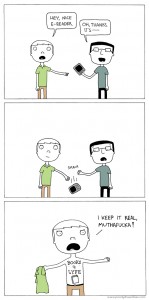I purchased a new book recently and it reinforced two different ideas from the course I have been thinking on. I work at a bookshop in Brighton called Thesaurus (yeah yeah we’re working on our social media) and as I often tell customers it is a cyclic process, as the majority of my pay goes back into the store. I spend so long recommending books to customers, reading reviews and unpacking fresh, interesting books and by the time payday comes I have a bag bursting with books and need and am broke again. I get a staff discount, but I also buy a lot of books… So it really does cancel itself out. The literary rampage I have embarked on in the last month has been particularly shameful, with books obscuring the reading lamp on my bedside table (ironic I know). But a big thick book came in the other day and I knew I was doomed. A 600 page beauty, large format first print edition with a matt, suede-like cover, thirty two dollars ninety five cents and its own display case. After reading a few reviews, and a few more I knew I was fated to buy Marisha Pessl’s Night Film, the latest book I couldn’t afford and didn’t have time to read. Foolproof.
What really sold the book to me was that it followed the footsteps of Mark Z. Danielewski’s House of Leaves. These books are concerned with the connection between form and function, which I see as a direct link to hypertext. I find this kind of writing fascinating. And although I don’t have the time to be picking up a tome for Night Film I made an exception. The bare bones of the plot are that the daughter of a highly regarded and borderline terrifying cult film director commits suicide, but it seems suspicious. Investigative journalist Scott McGrath, who had his life destroyed by said film director decides to look into the case. Seriously, that is the dum-dum version, and does it NO justice. But one of the things enriches an already strong and complex plot, is the way it veers off on tangents to explain certain aspects of the story.
This is where the hypertext comes in, bear with me. In the symposium we discussed what could be classified hypertext fiction, and although anything that is not online is not “legitimate” hypertext, it still has some of the same elements. Goosebumps books where the reader can choose their own adventure is a type of hypertext, and although it is what Landow would call “quasi-hypertext fiction”, I still think we must view it as hypertext at some level. Night Film is an even further cry from this, but I still think I could make an argument for hypertextual qualities within it. For example, if a news story is briefly mentioned in the plot, the next page will be a screenshot of the New York Times reporting it. If the protagonist references a police report, it is scanned and available to read before we even have the chance to question what he is talking about. Although a more linear representation of hypertext, it is reminiscent of reading a Wikipedia post. The moment your mind starts to wander, the next page is a tangent to satiate that curiosity. Although not “real” hypertext, it is reminiscent of those links that exist in hypertext. Exploring the liminality of hypertext and looking at it speculatively opens up a whole new area of discussion.
This also got me thinking about the symposium and the discussion of the “death of books”. Working in a bookshop, this is an idea I vehemently oppose. I feel like the only thing e-readers have going for them is that compress a book into a physically lighter version, making them easier to lug around. This has benefits, especially for travelling. But even then, wouldn’t you rather carry around a tattered Lonely Planet, highlighting places you want to go, annotating places you loved and scribbling over the shitty ones, stuffing pages with receipts and bookmarks you collect on your travels, plus you get to look like a cliché, old school journeyer, not an uppity twat who can afford an iPad and has stab me and steal my things stamped on their forehead. When Adrian asked if a school kid would rather bring a text to class or instead be able to conjure it up on their laptop, he made the latter seem undeniably better. But I deny it!! My year 12 English text, Dickens’ A Christmas Carol was about 80 pages long and half an inch thick at the beginning of the school year. As exams approached, it ballooned out to about two inches, with stickers and dog ears and scribbles and highlighted paragraphs embroidering the pages. It is one of the most prized possessions I own. Sentimentality doesn’t exist in the same way on an e-reader. I can’t imagine in years to come, telling my children to gather around and read granny’s ye olde ipad, tears pricking their eyes as I explain I reread the online text so much I nearly broke the screen. It’s just not the same.





